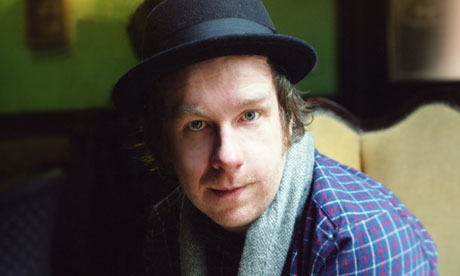
The Irish writer Kevin Barry's best short stories are like a spade to the face. Whether describing emergencies in which instinct shoulders aside intellect (a beleaguered hotelier facing floodwaters; a drug dealer imprisoned by highly sexed pagans) or charting quieter moments of loss (a bungled kiss at the fag-end of a party; the thwarted emotions of a group of real ale enthusiasts) there is a vividness to his writing that plants you immediately at its heart.
According to Isaac Babel, "a phrase is born into the world good and bad at the same time. The secret rests in a barely perceptible turn. The lever must lie in one's hand and get warm. It must be turned once, and no more." Barry (pictured) clearly knows his Babel: in his stories, phrases of sudden lyricism or savagery explode unexpectedly from banks of more conversational prose. In his first collection, 2007's There Are Little Kingdoms, the night announces itself "with its own starlit energies", and gloom floats down from the "morbid hills" of South Tipperary. The title story of his new collection describes the nightscape of Clew Bay in County Mayo, where the stars "hang a melody on the dark sky"; a fertile landscape seen from a car window is "fat on the blood of summer"; a horny farmer stands outside his lover's window, "priapic in the sour light of noon".
Short-story writers are often talented phrasemakers, but only the best ensure each phrase is as hardworking as it is attractive. Look again at those above: the thrill of starlight in "Atlantic City" transmits the limitless possibilities of teenage summers, particularly when rose-tinted by the narrator's adulthood; the hills above Clonmel are morbid because they encircle an alcoholic maudlin with booze; the stars above Clew Bay are like sheet music because we're regarding them through the eyes of a depressed self-harmer who accords significance, sentience and motive to everything around her. The car slicing through summer contains two retired women who prey on children; the very light of noon is sour in "Animal Needs", because the rural community it describes is in terminal rot. "The river is technically dead since 2002. There is addiction to prescription medications and catalogue shopping. Boys with pesticide eyes pull handbrake turns at four in the morning and scream the names of dark angels. Everybody is fucking everybody else."
In "Fjord of Killary", the highlight of this excellent collection, a blocked poet is beginning to grasp how unwise it was to buy an old hotel in North Galway. The hotel has 23 bedrooms "and listed westward. Set a can of peas on the floor of just about any bedroom and it would roll slowly in the direction of the gibbering Atlantic". Both "gibbering" and the slow, doomed roll of the peas precisely capture the beset psychology of the narrator, whose psychic distress will shortly be physically mirrored by a flash flood. This story, where every element works in unison, is the most successful blend of Barry's muscular comic gift with his attempts to portray sincere emotional shifts: the epiphanies of James Joyce's Dubliners, those instances where a whole life is apprehended, and sometimes transfigured, in a flash of realisation.
Not every story is so successful. "The Mainland Campaign", in which a young Irishman, Steven, falls for a German girl while planning a bomb attack on Camden Town tube station, compares unfavourably with a story by another Irishman who writes often of Tipperary and Cork: William Trevor. In his "A Mourning", an IRA handler appeals to a young labourer's resentment of a bullying foreman and dreams of heroism; in Barry's story there is action and plot, but Steven's motives remain unexplored. According to Trevor, "although a story need not have a plot it must have a point," which is what's lacking here.
"Beer Trip to Llandudno", conversely, has scant plot but carries plenty of meaning. It describes a Liverpudlian Real Ale Club's day-trip to Wales, and mines it not only for laugh-aloud comedy but a rich empathy, also. Moving nimbly from discussion of the "manky arse" endemic to the inveterate beer drinker to a more universal mournfulness at the things we scramble after and often lose in the course of a life, Barry earns comparison with the great and shamefully neglected VS Pritchett, whose short stories also employed pronounced comic means for serious, compassionate ends.
• This article was corrected on 1 May 2012 as it originally located Clew Bay in County Galway, rather than Mayo.

